Vegetarian Meal Plan For Weight Loss: Many people seek new ways to live a healthy life and lose weight. With busy lifestyles, readily available fast food, and abundant food at social events, controlling weight can be a big challenge. But what if you were told you can lose weight by eating delicious, satisfying foods without meat? Yes, a well-planned vegetarian meal plan can be the biggest helper on your weight loss journey.
Why is a vegetarian meal so effective for weight loss?
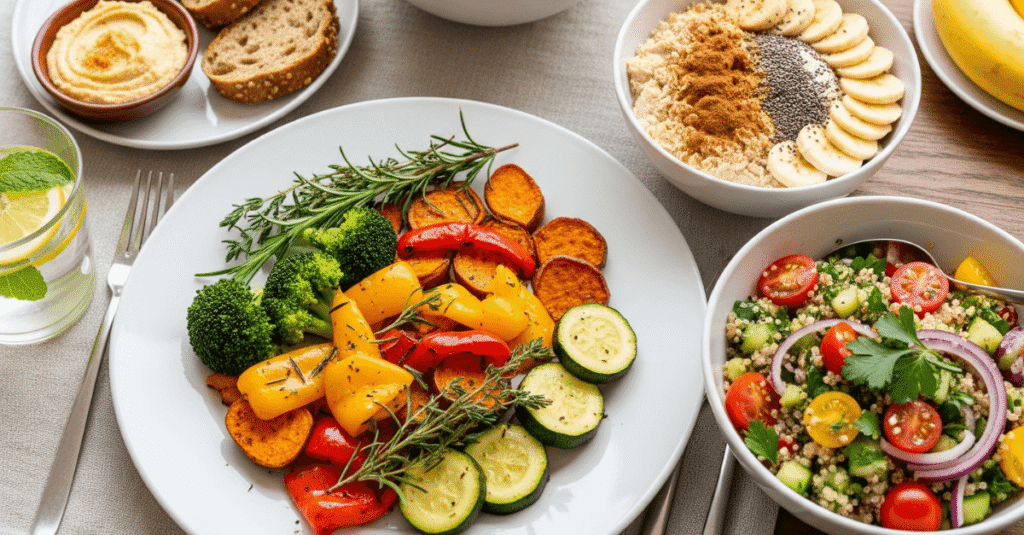
Plant-based diets are growing in popularity. This is not only due to ethical or environmental reasons, but also to their many health benefits. Here are some of the main reasons why they are effective for weight loss:
- Naturally low in calories: Plant-based foods, such as vegetables, fruits, and grains, are low in calorie density. This means that you consume relatively few calories even when you are full. For example, a bowl of vegetable-filled salad will give you the satisfaction you deserve. Its calories are much lower than those of a cheeseburger.
- Abundant in fiber: Fiber is a secret weapon in weight loss. It slows down the digestive process, which keeps you full for longer. High-fiber foods like apples, oats, beans, and broccoli keep your appetite in check and prevent you from overeating.
- Sources of healthy fats: Instead of saturated fats found in meat, a vegetarian meal includes healthy fats like avocado, nuts, and olive oil. These are good for the heart and help with weight management.
- Increases metabolism: Studies have shown that a plant-based diet helps increase the body’s metabolic rate. As a result, the body can burn more calories even at rest.
- Accessibility: While it was once difficult to find vegetarian options, the situation is completely different now. From Trader Joe’s and Whole Foods to large supermarkets like Walmart and Costco, there is now a huge selection of plant-based products.
Your Vegetarian Plate: The Right Balance of Nutrition
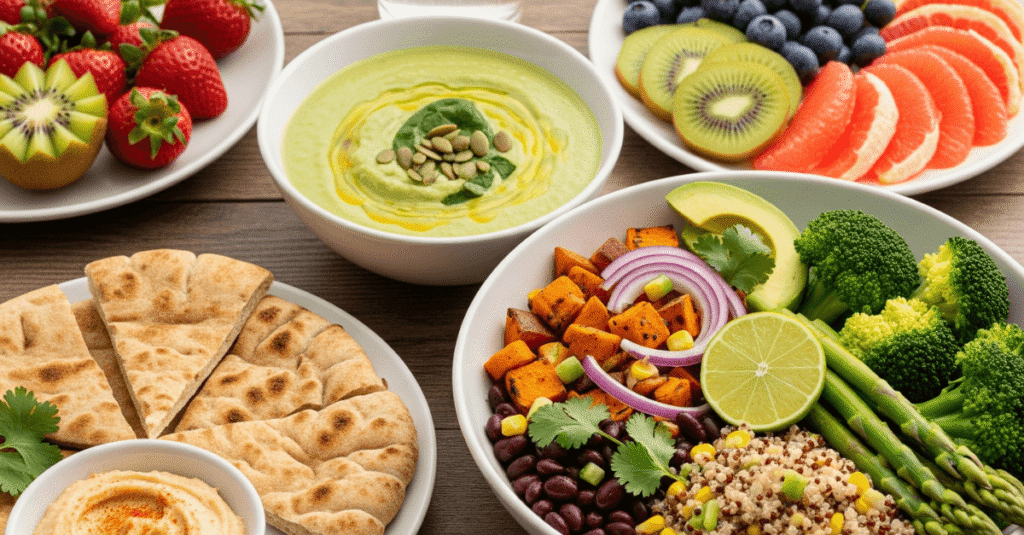
It is not enough to eliminate meat to lose weight; maintaining the right nutritional balance is also very important. Otherwise, weakness and dietary deficiencies can occur.
1. Protein: The main source of energy
Many people fear protein. But vegetarian foods also have excellent sources of protein, which are easily available in supermarkets.
- Pulses and Beans: Black beans, kidney beans, and lentils are great sources of protein and fiber. You can use them to make chili, soup, or tacos.
- Tofu and Teff are protein-rich foods made from soybeans. A tofu scramble is a great alternative to eggs for breakfast.
- Quinoa: This grain is a complete protein containing all nine amino acids necessary for the body.
- Greek Yogurt is a great source of protein. When eaten with fruit for breakfast, it will keep you energized for a long time.
- Nuts and Seeds: Almonds, walnuts, chia seeds, and flaxseeds are good sources of healthy fats and protein.
2. Carbohydrates: Essential for energy
It is a big mistake to eliminate carbohydrates for weight loss. You need the right or complex carbohydrates.
- Whole Grains: Choose whole-wheat bread, brown rice, or quinoa instead of white rice.
- Oats: Oatmeal is a great option for breakfast. It is rich in fiber and keeps you full for a long time.
- Sweet Potato: It is a great source of vitamins and fiber.
3. Fats: Healthy fats
Not all fats are bad. The right fats are essential for your body.
- Avocado: Avocados are full of healthy monounsaturated fats and are perfect for salads or toast.
- Olive Oil: Use virgin olive oil in salad dressings or cooking.
- Nuts and Seeds: You can eat nuts in small quantities as snacks.
7-Day Vegetarian Weight Loss Meal Plan
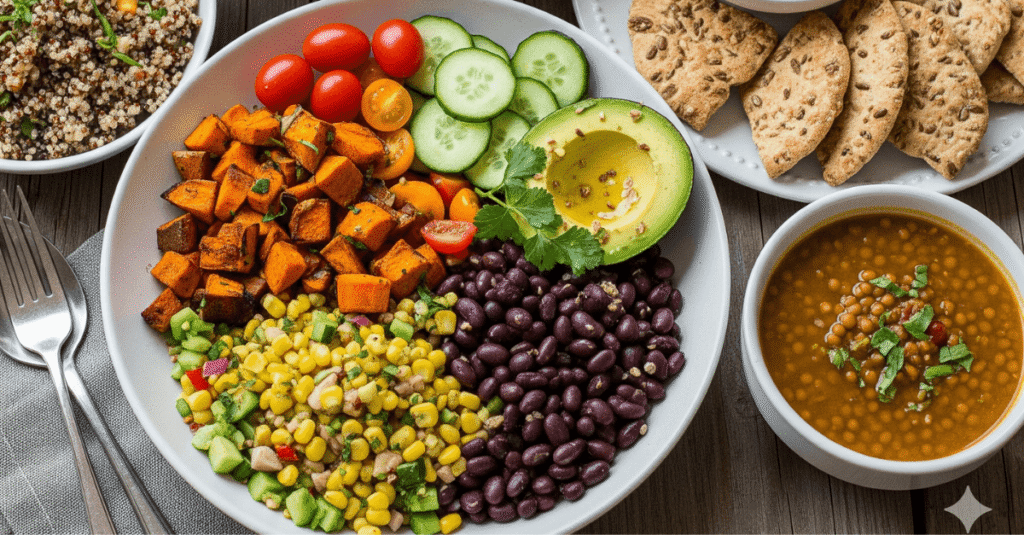
This sample plan is based on 1500-1800 calories, which is helpful for most people who want to lose weight.
Day 1
- Breakfast: 1 cup oatmeal (with berries and a tablespoon of almond butter).
- Lunch: Quinoa salad (made with mixed greens, cucumber, tomato, and black beans, with lemon dressing).
- Dinner: 2 black bean tacos (with corn tortillas, salsa, and avocado).
- Snack: An apple.
Day 2
- Breakfast: Tofu scramble (made with spinach, onion, and turmeric) and a slice of whole-wheat toast.
- Lunch: Lentil soup and a small side salad.
- Dinner: Vegetable stir-fry (broccoli, bell pepper, carrot) with brown rice.
- Snack: A handful of almonds.
Day 3
- Breakfast: Greek yogurt parfait (layered yogurt, granola, and fruit).
- Lunch: Hummus and vegetable wrap (hummus, cucumber, carrot, and lettuce on a whole-wheat tortilla).
- Dinner: Veggie burger (whole-wheat bun with lettuce and tomato).
- Snack: Baby carrots and hummus.
Day 4
- Breakfast: Smoothie (made with almond milk, spinach, banana, and a scoop of protein powder).
- Lunch: Leftover vegetable stir-fry.
- Dinner: Baked sweet potato (topped with black beans, corn, and Greek yogurt).
- Snack: An orange.
Day 5
- Breakfast: Avocado toast (mashed on whole-wheat toast, sprinkled with salt and pepper).
- Lunch: Cauliflower rice bowl (with roasted vegetables and tofu).
- Dinner: Whole-wheat pasta (with lots of vegetables and tomato sauce).
- Snack: A handful of walnuts.
Day 6
- Breakfast: Chia seed pudding (chia seeds soaked in almond milk overnight, garnished with fruit in the morning).
- Lunch: Mediterranean salad (lettuce, cucumber, tomato, olives, feta cheese, and chickpeas).
- Dinner: Vegetarian chili (made with various beans and vegetables).
- Snack: A pear.
Day 7
- Breakfast: 2 whole-wheat pancakes (with maple syrup and fruit).
- Lunch: Leftover vegetarian chili.
- Dinner: Homemade pizza (whole-wheat pizza base with tomato sauce, lots of vegetables, and a little cheese).
- Snack: Rice cakes and peanut butter.
Food Scene and Social Life Management
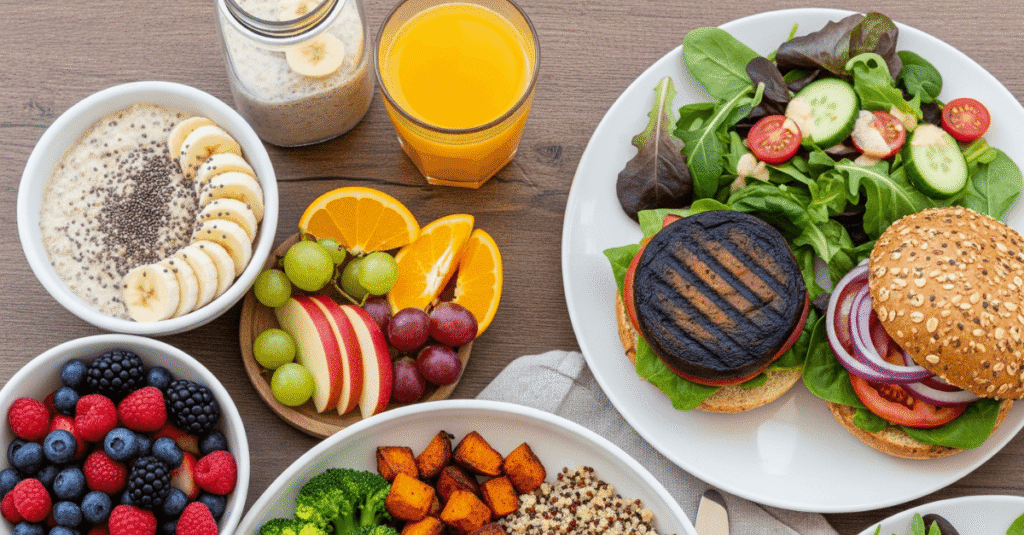
Following a vegetarian meal doesn’t mean giving up your social life. A few smart strategies will help you stick to your diet no matter what.
- Eating out: Check the menu online before you go out. Most restaurants now have vegetarian or vegan options. You can choose from salads, veggie burgers, or pasta. Ask for dressings or sauces on the side to control the amount.
- Barbecue (BBQ) parties: BBQ is a big part of the culture. For such events, you can bring yourself a veggie burger or grilled vegetable kebab. Most BBQs have side dishes like corn on the cob, potato salad, or coleslaw.
- Thanksgiving and other holidays: Plenty of plant-based recipes exist during the holidays. Roasted vegetables, maple-glazed carrots, mashed potatoes (made with plant-based milk and butter), and lentil loaf can be healthy
alternatives to your turkey.
FAQs about Vegetarian Meal Plan For Weight Loss
Question 1: Is a vegetarian meal enough protein to build muscle?
Answer: Absolutely. Many athletes follow a completely plant-based diet. You need to ensure you eat enough protein-rich foods daily, such as tofu, lentils, beans, and quinoa. You can have a plant-based protein shake after a workout, which is widely available in the US.
Question 2: Why do I get hungry so quickly after eating vegetarian food?
Answer: This may be because your diet does not contain enough protein, fiber, or healthy fats. Maintain a balance of these three components at each main meal. For example, add some nuts or a spoonful of peanut butter instead of just eating fruit. This will help you stay full for longer.
Question 3: Are processed vegetarian foods like veggie burgers or sausages healthy?
Answer: Not always. Many processed vegetarian foods can be high in sodium, preservatives, and unhealthy fats. Read the nutrition facts on the back of the package before buying. Try to eat as many natural and minimally processed foods as possible.
Question 4: How do I meet my vitamin B12 needs?
Answer: Vitamin B12 is found primarily in animal foods. Therefore, deficiency is a common problem for vegetarians. Most almond milk, soy milk, and breakfast cereals in the United States are fortified with vitamin B12. Nutritional yeast is also an excellent source. However, it is best to be safe and consult a doctor before taking a B12 supplement.
Question 5: What should I do if my family or friends do not support my vegetarian meal?
Answer: Calmly share the reasons behind your decision with them. Tell them your health goals. You can cook for them or share a delicious vegetarian dish you have prepared with them. Over time, they will learn to respect your new lifestyle.
Conclusion
Weight loss is a journey, not a race. Following a vegetarian meal plan that fits your lifestyle is not only possible but can also be a fun and sustainable change for your health and well-being. With the right planning, delicious food, and a positive mindset, you can easily reach your weight loss goals and enjoy a vibrant and healthy life.

Hi, I’m M Saif, a digital marketer with a strong focus on SEO and content writing. I help businesses improve their online visibility, drive organic traffic, and create engaging content that converts. With a results-driven approach, I work on strategies that not only boost rankings but also deliver real value to audiences.



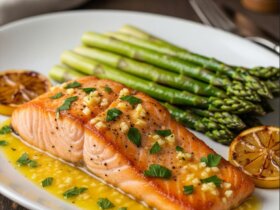





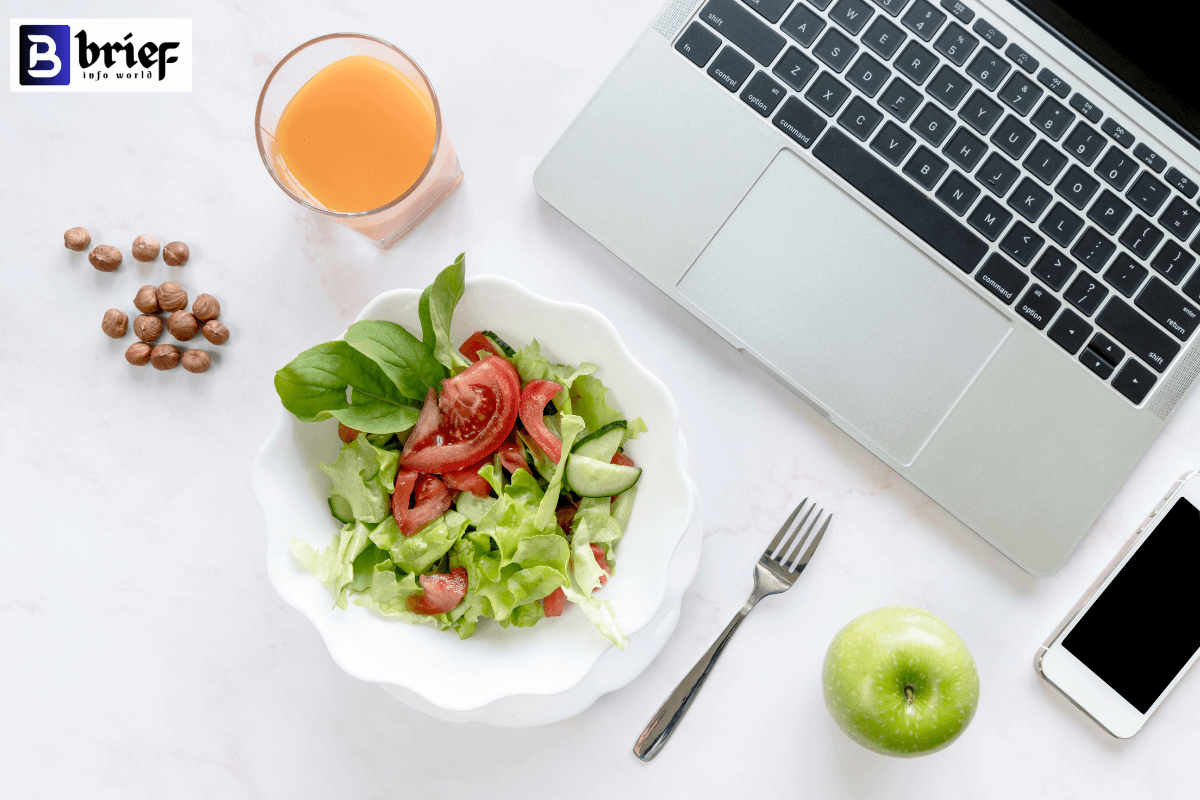
Leave a Reply